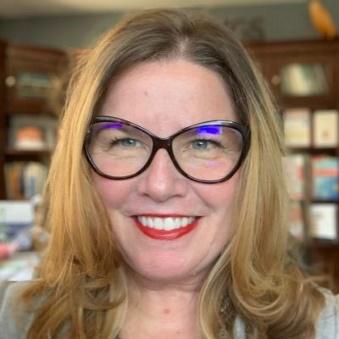Literacy Leadership
Early childhood educators undoubtedly are questioning why so many children leave their classrooms without a good foundation in reading. Some emergent readers come to school and catch on fast. But there are many more children who are slow to catch on, and some who never do. Something in their early education didn’t work, didn’t click, or was missed. In middle school, these students are struggling.
Reading failure is all too common in our schools, but you can flip the script to improve reading outcomes. How? By learning about the latest research on the Science of Reading, by challenging assumptions about how our brain learns to read, by joining others with a similar goal, and by influencing up, down and across the aisle. Read on to learn how three educators changed the course of reading instruction in their schools.
Leading UP – Advocating for Effective Early Reading Instruction 
Missy Purcell, a former elementary teacher in Gwinnett County, GA, realized she was underprepared to teach reading after many years. The balanced literacy approach she had been taught in college was ineffective. Her AHA moment came into full display during the pandemic as she observed her own three children during their reading instruction. She had one child in general education, one in special education, and one with a learning disability. None of her children were catching on. “It struck me that this wasn’t a remediation issue, or a Tier II or Tier III problem…it was a failure in Tier I instruction,” she said.
As a knowledgeable and passionate educator, Purcell sought new knowledge on structured literacy and explicit instruction. She immersed herself in the Science of Reading, and attended Board of Education meetings to advocate for change. She wrote to and met with her Superintendent who listened to her concerns. Coming from an honorable quest to help more children succeed, Purcell opened new dialogue to solve the lingering reading problem. Her district began to implement early literacy pilots. She joined a community of people advocating for children with dyslexia. She built credibility through knowledge and leadership, and succeeded in furthering the mission.
Leading ACROSS the Aisle Advocating for Professional Knowledge
Dr. Lori Severino, a former Assistant Professor of Special Education at Drexel University and Co-Founder of Credentials Unlimited, taught in public education for 26 years. In her high school English classes, many students with special needs could comprehend what she read aloud, but could not recognize words or read fluently on their own. Severino took courses in the Wilson Reading Program. She became a certified trainer, and has trained hundreds of teachers in structured literacy. She co-authored a book, “Using Creativity to Address Dyslexia, Dysgraphia and Dyscalculia: Assessments and Techniques.”
Now in 2022, the instructional approaches she helped implement are working. Students are graduating and reading at grade level. Dr. Severino encourages educators to explore professional learning through “micro-credentialing,” taking small steps to develop specific skills through high-quality coursework. She advocates at the higher education level for pre-teachers to receive Science of Reading training. She encourages grassroots efforts to press legislators for more funding for professional learning in reading instruction. She urges colleges of education to align teaching standards with the Knowledge and Practice Standards for Teachers who Teach Reading (KPS) from the International Dyslexia Association. For her service in the literacy field, Servino received the 2019 Floyd G. Hudson Award from the Council for Learning Disabilities.
L eading DOWN – Modeling Leadership - Learning In the Trenches
eading DOWN – Modeling Leadership - Learning In the Trenches
Superintendent Jake Flowers leads a small K-8 district in Peoria, Illinois. He began his journey into the Science of Reading in late Spring/Summer of 2021, after reviewing data on reading outcomes.
His teaching staff was delivering a balanced literacy approach they believed was effective, but reading data suggested otherwise. They needed to add more phonics and structured literacy into daily instruction.
Flowers joined the Facebook group “Science of Reading,” read books, and hired consultant Dr. Neil Thompson. His leadership style is to lead through modeling and to get into the trenches of learning the Science of Reading with his teaching staff.
“It’s hard to change minds, but we’re making progress,” says Flowers. “There’s a quote, ‘Go as fast as you can, but as slow as you must,’ but let’s not slow the positive progress students are now making.” He recommends bringing all the staff together to join the conversation, looking at data, and to not place too many labels on students as learners.
The Ripple Effect – Improving Equity Through Reading
At the end of the day, it’s all about the children. Making your collective goal to improve reading outcomes isn’t easy, but it can be done with knowledge and leadership. It’s not about your title or position. It’s about the ability to question assumptions, to pursue lifelong learning, and to find ways to influence others objectively and positively. It's about partnerships, and accountability. It’s about finding people who strengthen your resolve.
These are educators who know that when we know more, we do better. What matters most is that you take action, and become a literacy leader now.
Professional Learning and Community
Learning Ally’s Professional Learning Services are designed to strengthen educator’s instructional capacity, so they can deliver a deeper, richer learning experience and promote better academic outcomes.
Learning Ally’s Educator Community is a place to learn, share, be yourself, and grow.
Access our Spotlight on Literacy Leadership event on-demand at no cost now through May, 2023, and stay tuned for more events coming in early 2023.
This handout on “Literacy Leadership and Influence” offers talking points that may help you begin a dialogue with peers, colleagues, and administrators about exploring the science of reading and brain-based learning best practices.
Valerie Chernek writes about educational best practices through the use of technology and the science of reading in support of children and adolescents who struggle with learning differences.